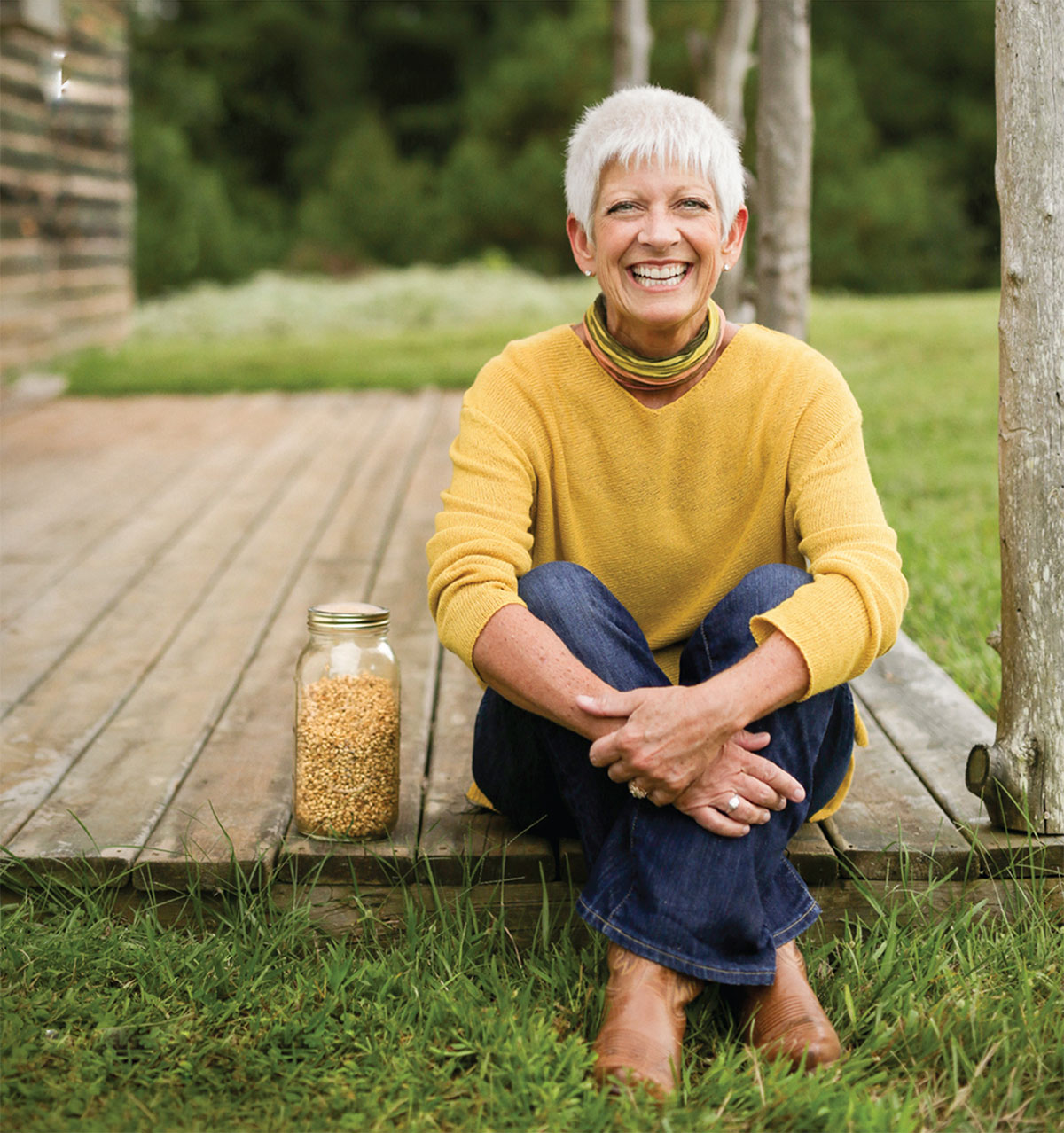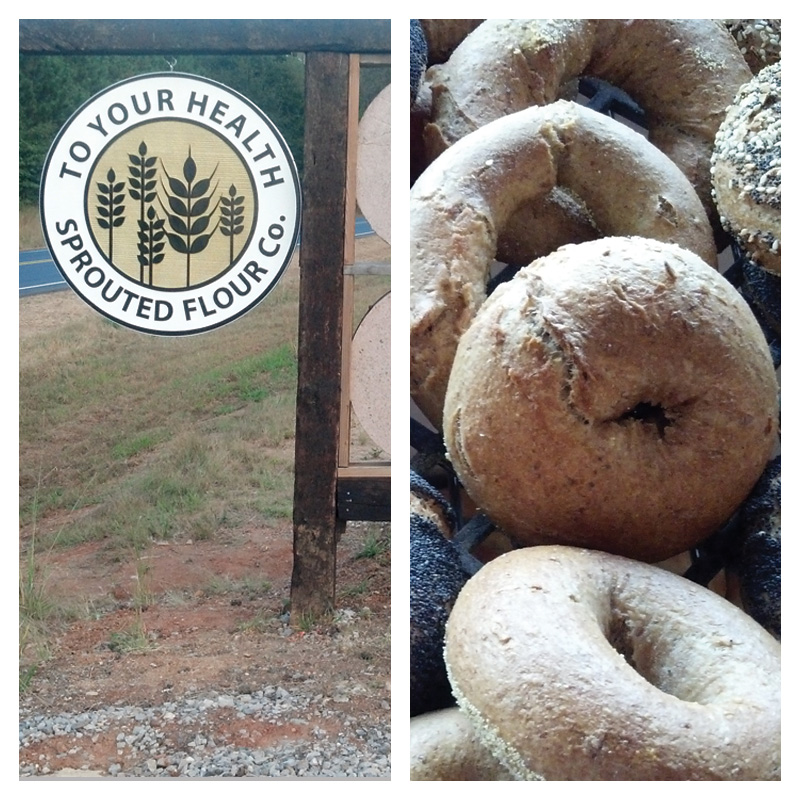In the beginning, Peggy Sutton was just trying to feed her family healthier foods. She’d read that soaking grain until it begins to sprout makes it easier to digest, and that previous generations regularly sprouted their grains before eating them. So she grabbed a mason jar and gave it a try, following instructions she found in a primer about historical food preparation.
“I sprouted the grains, dried them, milled them, made a loaf of bread and thought, oh my gosh, this is fabulous,” said Sutton.
Inspired by her initial successes, she decided to start a business baking breads, pastries and cakes from sprouted grains. In the finest tradition of rock bands and tech companies, her first headquarters was in her garage in rural Alabama.
Like most home-based food businesses, Sutton’s first clients were local. But as word spread, demand grew. Soon, she was getting orders from clients in California — orders she’d have loved to fill, if not for the fact that she worried her preservative-free baked goods would spoil on their 2,500-mile journey. But Sutton realized she’d uncovered a vast, untapped market perfectly aligned with consumer demand for natural, sustainable and ethical foods. And a nagging question entered her mind: what if her product wasn’t the baked goods themselves, but the flour that made them?

Today, more than a decade after those first baking experiments, To Your Health Flour Co. (Sutton’s the CEO) has blossomed from a modest garage-based startup to a full-blown behemoth, leading a new category in the cereal sphere. Sutton said consumer demand for sprouted grain products has skyrocketed over the last 10 years, from a tiny niche among the most health-conscious consumers, to a mainstream international trend.
To Your Health sells its products directly to consumers through its online store, and through grocery stores like Whole Foods. However, more than 80 percent of its current business is to the ingredient market, selling to manufacturers of crackers, cereals, cookies, chips, bars and other pantry staples, including buyers like Kashi (Sutton was recently featured on the back of a cereal box). The company has also introduced lines of sprouted nuts, seeds, beans and pulses.
Today, the company occupies a 48,000-square-foot, all-organic sprouted grain mill in Fitzpatrick, Alabama. It produces 70,000 pounds of sprouted flour each week, and a planned expansion will take capacity up to 250,000 pounds per week. The company ships to buyers in 14 countries, from Australia and South Africa to Mongolia, and Sutton sees no sign of global consumer demand slowing.
“I think the market is wide open,” she said. “So we’re looking forward to growing.” But for Sutton, growth for growth’s sake isn’t enough; she wants to use her company’s success to support Alabama’s farmers — and, by extension, the entire community.

Which came first, the organic mill or the organic grain??
Organic mills are among the most critical, and overlooked, components of the organic grain economy — and there aren’t a lot of them. According to Mercaris, an agricultural market research firm, between 75 and 100 certified organic mills operate in the United States, and many of those process conventional as well as organic grain. Lizzie Ekeberg, director of market operations at Mercaris, said organic mills are spread relatively evenly across the country, with the highest concentrations in the Midwest. But the Southeast, where To Your Health Flour Co. is located, has fewer organic mills.
There’s a classic chicken-and-egg conundrum in this dynamic. The proximity of an organic mill can be a deciding factor for prospective organic growers. Unlike many fresh market growers, grain growers are separated from their consumers by multiple layers of infrastructure, like grain elevators, co-operatives, mills and ingredient companies. Profit margins on grain are slim, which means every extra cost matters, including the cost of transportation — and the relatively spread-out landscape of existing organic mills means many growers need to travel far.
“Organic, as a rule, tends to travel longer distances than conventional,” said Ekeberg. “It’s not unusual for a grower to travel 100 miles to deliver organic grain.” If the closest organic mill is too far away, farmers have little incentive to grow organically, which puts them at the mercy of the global commodity grain market and keeps profit margins razor-thin.
In other words, there aren’t many organic grain growers in Alabama, so there’s a lack of organic mills, so there aren’t many organic grain growers. That means To Your Health buys most of its raw organic grain from major grain-growing regions — the Northwest, the upper Midwest and Canada. (Specialty crops like quinoa can come from as far away as Peru.) Sutton would like to buy organic grain locally, but existing suppliers are few and far between.

So To Your Health is embarking on an effort to inspire a new wave of Southern organic grain growers.
“We’re working on a new initiative to try to establish an organic farmers’ co-op for the state of Alabama,” said Sutton. By working with the agricultural community and local universities, she’s hoping to offer young farmers interested in growing organically a local, guaranteed market for their crops, as well as assistance making the transition from conventional to organic.
As part of the initiative, To Your Health has already held roundtable talks with farmers across the state who are interested in either transitioning to organic or starting a new organic venture.
“It’s really exciting,” said Sutton. “I can finally say I buy local when I can get grains here in Alabama.”
It hasn’t been easy. Because organic agriculture is not well-established in Alabama, Sutton’s had to do some convincing. Some farmers are skeptical of the idea, so To Your Health is targeting the next generation as well.
“We start young now,” said Sutton. “We’re reaching out to a lot of school gardening programs and providing organic seeds, doing educational workshops and helping them set up their raised beds.”
These initiatives are in line with a larger trend in the organic milling industry towards partnership-based supply chains.
“Companies are taking a more strategic course,” said Ekeberg, “working directly with growers to guarantee accessibility and supply. It’s a win-win.”
Some are even starting producer programs, partnering with growers from the ground up, including support with organic certification.
“It makes sense for companies to do that to make sure they get the supply they need year after year, which is so important,” Ekeberg added.
For To Your Health, developing a local organic supplier community makes ethical as well as business sense. From a pragmatic perspective, transporting grain is costly, especially when it comes from as far away as Washington state or Idaho. Long-distance transportation also adds another layer of time and logistics, complicating supply chain dynamics.

But perhaps more importantly, bringing local growers into the fold is aligned with one of the company’s guiding principles: supporting the rural Alabama economy. Sutton was born and raised in Alabama, and her mill sits on family land. The company’s location in Bullock County puts it in one of the poorest counties in the state, and Alabama itself is routinely ranked near the bottom of all the states in terms of per capita and household income. To Your Health has already made a colossal impact on employment in Bullock County through its mill operations, which employ dozens of people.
“We’ve created lots of good, desperately needed jobs in Bullock County, and most of my employees live here,” said Sutton. “We originally thought we’d be better suited in the grain belt, but [being here] has not hurt our business, and we continue to grow. We’re proud to be able to help our area. And now we have the opportunity to bring farmers in.”
And, of course, organic farming isn’t just good for the farmer. Changes in agricultural practices can ripple outwards, boosting job creation, strengthening regional economies, improving environmental conditions and increasing local access to fresh foods. In rural Alabama, challenges are abundant, and those positive changes are desperately needed. But if To Your Health succeeds in advocating for organic grain in Bullock County, the solutions might be home grown.





















